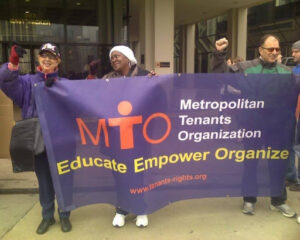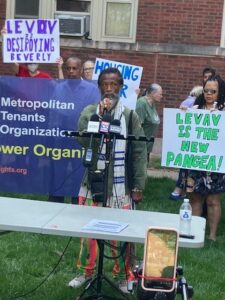
When Naeema moved into her new apartment, she was excited and thinking about the future in her new home. Within the first month, problems began appearing: the toilet would not flush, water pressure was not enough for a proper shower, and roaches scuttled across her floors.
Despite multiple attempts to get her property manager to address these problems, her concerns went unanswered, leaving her feeling stuck and frustrated. That is when Naeema reached out to MTO for help. After listening to her concerns, hotline counselors explained her rights under the Residential Landlord and Tenant Ordinance (RLTO), including her remedies for dealing with a neglectful landlord and her right to complain to Chicago’s Department of Buildings for an inspection.
With this information, Naeema felt empowered to act. Together, we helped her draft a letter to the management company detailing the issues and her rights as a tenant. The results were immediate.
Management agreed to let Naeema out of her lease without penalty and offered to refund her first month’s rent and move-in fee. Following this breakthrough, Naeema conducted a walkthrough of the apartment with the property manager. The unit was in the same condition as when she moved in, and the manager confirmed the refund and lease termination. Within that same week, Naeema picked up her refund check, covering her first month’s rent and move-in fees in full. She then moved out, leaving behind the stressful conditions and regaining peace of mind. Naeema’s persistence, combined with the right support and knowledge of her tenant rights, turned a demanding situation into a positive resolution. Now, she is ready for a fresh start in a home that meets her needs.



 Only A Judge Can Evict You
Only A Judge Can Evict You HUD tenants recently had concerns about bed bugs, issues with re-certification, retaliation by management, and the use of their community room in their building. Management at first did nothing to resolve the complaints. Tenants called MTO and building organizer David Wilson went to the building and informed them of their rights. Tenants in the Park Shore East building located at 6250 S. Harper then formed an association.
HUD tenants recently had concerns about bed bugs, issues with re-certification, retaliation by management, and the use of their community room in their building. Management at first did nothing to resolve the complaints. Tenants called MTO and building organizer David Wilson went to the building and informed them of their rights. Tenants in the Park Shore East building located at 6250 S. Harper then formed an association.

 Mr. Green and the other tenants testified every year at
Mr. Green and the other tenants testified every year at 

